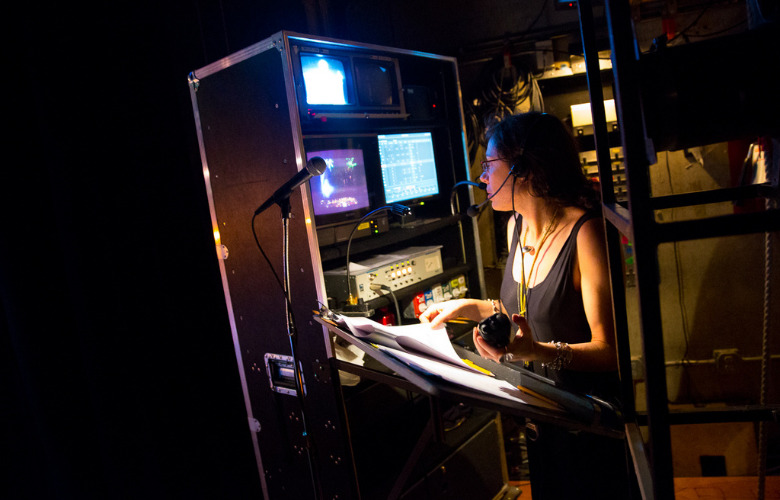
SMA is the Stage Managers’ Association. It is an organization based in the USA. However, its International Cohort is growing as well since it began in early 2019. A “UN of Stage Managers” with currently over 25 ambassadors from 15 countries on 6 continents. On July 5, 2021, SMA Director-at-Large David J. McGraw and Editor in Chief/International Cohort Chair Hope Rose Kelly from the USA met for an online discussion with SMA International Cohort Ambassador Anna Robb in Hong Kong. Together, they compared the work conditions of Stage Managers working in both regions and around the world. Drawing on their own experiences as stage manager as well as looking at a 2019 survey, their findings are profound and of imminent importance. We are sharing the highlights of their discussion in an article series of 4 parts. This is part 3.
In this third part, Dave and Anna discuss the benefits of contracts, salary conditions around the world, and working abroad.
Dave: For full-time contracts, yes, that will be the expectation. For stage management, the benefits don’t come from the producer. They come from the union.
There is a certain number of weeks you must work in a year to become eligible for benefits. Which is different from other industries.
Also, if you are a non-union stage manager, benefits, particularly health insurance, are not an expectation. However, they are something that could be negotiated.
Dave: There have been some changes that now make it more of a requirement that you have it. So yes, some SMs will end up paying for it themselves.
In the US, if you can negotiate for it or not mostly comes down to the distinction between employee and independent contractor.
If you are an employee, you should have benefits like healthcare. If you are a contractor, you are your own employer and can’t expect to receive benefits.
The issue here is that, in my opinion, no SM is an independent contractor.
Because, in the US, to be an independent contractor you must be in complete control of where you work as well as when you work. And it must be a short-term business relationship.
However, sometimes unscrupulous producers force people who are not in a position to bargain to sign the contract as an independent contractor. It’s the worst deal you can get. You don’t have any of the benefits and you don’t have control.
Dave: Yes, in the USA 401(k) is a retirement savings plan that is usually invested in the stock market. 403(b) is the equivalent if you work for non-profit.
Both plans are not an expectation. If you are union and in higher level contracts, possibly. But if you are non-union, it is at best optional, and many times not offered.
Anna: So, if you are not getting any of these benefits that means, you’ll have to make them out of your salary. Which will cut your income drastically.
Dave: For many, being a stage manager is still a migratory position. Thus, housing is often part of the discussion.
Our 2019 SMA Survey shows that travel, transport, parking, equipment, or even choosing your ASMs, etc., are also part of the negotiation process.
Sadly, what our survey showed as well is that an overwhelming number of people didn’t negotiate at all.
Always negotiate! Keep going! If nothing else, they will see that you will represent their needs well because you are a tough negotiator.
Anna: In Australia it is similar that you can be an independent contractor, freelancer, or an employee.
Important is to understand that if people don’t get contracts with a retirement fund early in their lives, then they’re not being set up successfully for the long term.
There should be more education, especially for people who come in via tertiary education, about how to manage and negotiate your own standing. Or you’ll find yourself at a great disadvantage.
Globally, of course, each country has its own set-up.
In Macau, for example, we didn’t have a retirement fund either.
However, the producers wanted good coverage in case someone got injured. So, we had the best health insurance I’ve ever seen in my life. Everything was included.
But the major benefit of being in Macau was paying only about 4% tax. This compared to the approximately 35% I’d be paying in Australia. It was a unique opportunity to take those extra earned dollars and put them into a retirement fund.
Now, in Hong Kong we have a very good public health system which is incredibly low cost.
When you move from country to country you need to understand the context.
Maybe, at face value, your salary looks great. But how high is the cost of living? What healthcare system does this country have? Which costs are your responsibility? Etc.
You need to be aware and make sure that, over the years, you get the security that you need.
Dave: If you are into working as a stage manager for the long run, then you need to invest in your own savings early. So you can do this as a marathon, not a sprint.
I turned union when I was 23 (which is unusual). I was lucky. And I went from 250 USD/week to 600 USD/week. This increase in salary allowed me early to put money away.
And this is my advice for everyone in our business: Make the decision to put money away when you make that first jump in your career. Save more rather than spend more. You are investing in your whole career.
Anna: In Hong Kong and the surrounding area there is no standardization. Thus, there is a lot of leeway and often employers don’t know what they should be paying you. If they really want you, you can negotiate a higher rate.
But even with a full-time contract in Hong Kong in the entertainment industry, you are not earning enough money to put much in the bank.
Working internationally is challenging. You have to expend a lot of additional energy in your daily work to adapt to the local way of working.
This is what makes discussions like this so important. To be able to take the good things from different parts of the globe and try to improve our own conditions.
And to have context when you are fighting for health insurance, benefits, or enough salary to live.
That is also why your work is so important Dave, as you build on this SM Survey. Data is important. It allows you to start to look at what changes, at how things change. Which then gives you the evidence to start fighting for better conditions.
Dave: Thank you. I agree that context is everything.
Talking about when an SM moves to a different country. I think it is also important to understand that you were not invited to impose your cultural expectations.
You were hired because you can adapt, and you are able to manage people and resources.
Anna: In 2018, I did a show for the launch of a company in the UAE.
There is always this routine where, if His Highness is going to attend the event, protocol come in a day before. They review the conditions to make sure everything is fine.
If they deem something to not be safe enough you must change whatever they say you need to change. There is no argument.
For our show, protocol decided the day before that they were going to change from which entrance His Highness is going to enter the venue.
It messed up about five of our pathway installations. So, we literally spent the entire night switching everything.
In this case, in this country, for example, this is just the expectation.
There is a high level of acceptance that if you are going to be in the event industry, this is what will happen and how you have to work.
For me it was just one gig. But if you work like this all the time, you will not have a work-life balance.
I find that fascinating. You go into a different culture. You work there. And in the end, like you said Dave, all you can do is adapt and say, “I can’t change this. I’ll just have to deal with it.”
For those of you who missed the first parts of the discussion:
Part 1
Part 2
Official Website of the SMA Stage Managers Association.
The SMA International Cohort page.
Dave McGraw, Hope Rose Kelly, and Anna Robb are all experienced entertainment professionals.
Dave has enjoyed a varied career in Arts Entrepreneurship
and Stage Management. Since 2017, he has served as the Program
Coordinator for the thriving Arts Administration program
at Elon University.
Hope is an Equity Stage Manager based in the Berkshires.
She has worked at many companies in the Northeast and
across the Unites States.
Anna is Co-Founder and Managing Director for TheatreArtLife.
She is an experienced Producer/Production Stage Manager.
Her 20-year work history spans Asia Pacific, the Americas, Africa,
the Middle East and Europe.
Keep Your Cool Backstage as a Stage Manager: 12 Insights
Don’t Wear That Hat: Theatre Superstitions and Their Origins


Liam Klenk was born in Central Europe and has since lived on four continents. Liam has always been engaged in creative pursuits, ranging from photography and graphic design, to writing short stories and poetry, to working in theatre and shows. In 2016, Liam published his first book and memoir, 'Paralian'.
Read Full Profile© 2021 TheatreArtLife. All rights reserved.

Thank you so much for reading, but you have now reached your free article limit for this month.
Our contributors are currently writing more articles for you to enjoy.
To keep reading, all you have to do is become a subscriber and then you can read unlimited articles anytime.
Your investment will help us continue to ignite connections across the globe in live entertainment and build this community for industry professionals.